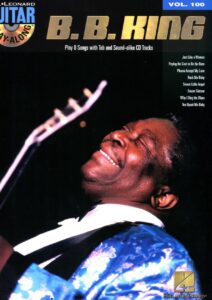Browse in the Library:
Play Guitar with B.B. King – Rock me, Baby (background Play Along only with sheet music download)

Lyrics
Rock me baby, rock me all night long
Rock me baby, honey, rock me all night long
I want you to rock me baby
Like my back ain’t got no bone
Rock me baby
Honey, I want you to rock me slow
Rock me baby
Honey, I want you to rock me slow
Want you to rock me baby
Till I want no more
Rock me baby
Like you roll a wagon wheel
Roll me baby
Like you roll a wagon wheel
I want you to roll me baby
You don’t know how that makes me feel
Rock me baby
Honey rock me all night long
Rock me, rock me, rock me, rock me, baby
Honey rock me all night long
I want you to rock me baby
Like my back ain’t got no bone
Songwriters: J. Josea / B.B. King
Rock me, baby
Rock Me Baby is a blues standard that has become one of the most recorded blues songs of all time. It originated in Rockin’ and Rollin’, a 1951 song by Lil’ Son Jackson1, itself inspired by older blues. Versions by Muddy Waters and B. B. King made the song famous. When B. B. King’s recording of Rock Me Baby was released in 1964, it became his first single to reach Top 40 on Billboard magazine’s Hot 100 chart.
Past songs
B. B. King’s Rock Me Baby is based on Lil’ Son Jackson’s 1951 song Rockin’ and Rollin’. King’s lyrics are almost identical to Jackson’s, although the songs are instrumentally different: Rockin’ and Rollin’ is a solo piece, with Jackson on vocals accompanying himself on guitar, while Rock Me Baby is a collective piece.
Muddy Waters’ song Rock Me, recorded in 1956, is also based on Jackson’s. Some Jackson lyrics are used, but Waters also incorporates a few lines from his 1951 All Night Long (also based on Rockin’ and Rollin’). Muddy Waters’ version also uses Jackson’s guitar tune and vocal start on the 4th chord. He interprets it as an unusual fifteen-bar blues (an unequal number of bars, rather than the traditional 12, or even 8, or 16 bars). Muddy Waters recorded a second version of Rock Me for his album I’m Ready in 1978.
Jackson’s Rockin’ and Rollin’ is itself inspired by earlier blues songs. Many songs from the 1920s through the 1940s use a combination of rock, roll, baby, and mama in the title or lyrics, although instrumentally they are different from Rock Me Baby, Rock Me, or Rockin’ and Rollin’4. Big Bill Broonzy’s 1940 song Rockin’ Chair Blues is the basis for several interpretations4 and frequently uses the phrase rock me baby, for example, ‘Rock me baby now, rock me slow… now rock me baby.’, one time before you go.
Rock Me Mama, Arthur Crudup’s 1944 song, is also based on the Broonzy4 song and repeats the same chorus, but uses mama instead of baby. Roll Me Mama, a 1939 song by Curtis Jones, shares a few phrases with Rockin’ and Rollin’ (‘like a wagon wheel’, ‘ain’t got no bone’).
Version of B.B. King
The song follows a 12 bar blues’ chord progression and is performed in a moderate tempo in the key of C, over one bar at Music4.
King’s guitar fills are a key part of the song, sparking its appeal to guitarists. The piano part is also important. Joe Bihari, one of Kent’s owners, recalls the pianist frequently collaborating with King, Maxwell Davis, although others have been suggested, such as Lloyd Glenn or Jimmy McCracklin.

There are doubts regarding when B. B. King recorded Rock Me Baby. Although King signed with ABC-Paramount Records on January 14, 1962, his former label, Kent, continued to release singles (and albums) well into the 1970s. Estimated recording dates range from ‘ca. 1958’ to before 1962.
The song was released shortly after the release of How Blue Can You Get on Paramount in 1964, and reached number 34 on the Billboard Hot 100. Rock Me Baby is the first of B. B. King’s six records to reach the Top 408. In 1997, King re-recorded the song with Eric Clapton for the album Deuces Wild.
Over the years, many blues and other artists performed and recorded Rock Me Baby, which became a blues standard2. Although 1951’s Rockin’ and Rollin’ by Lil’ Son Jackson serves as the basis for many versions, B.B. King and Muddy Waters’ renditions are the ones that made it famous.
